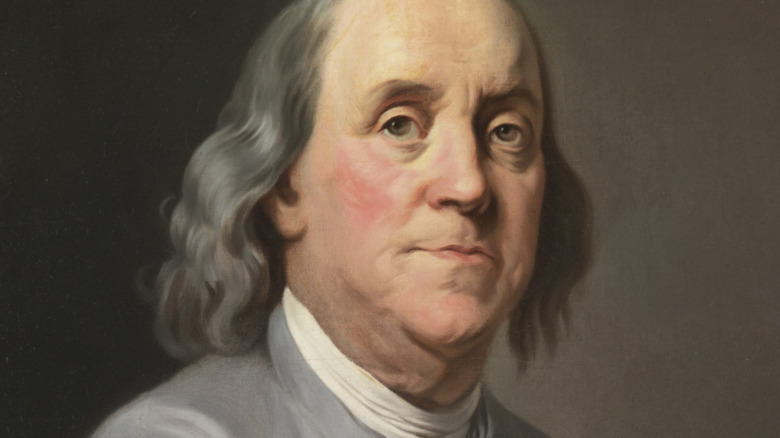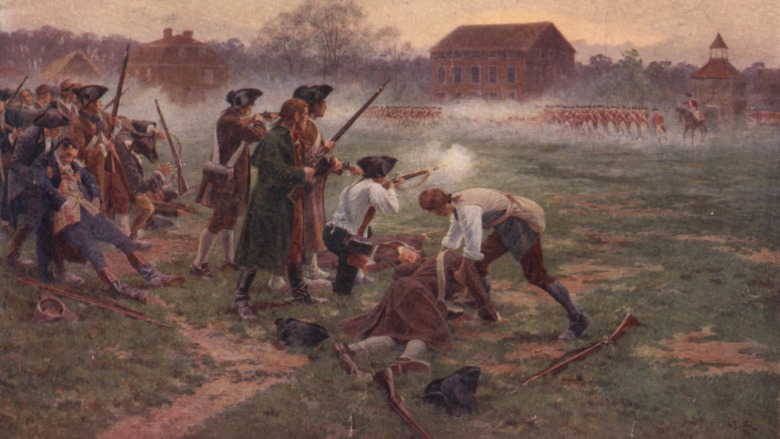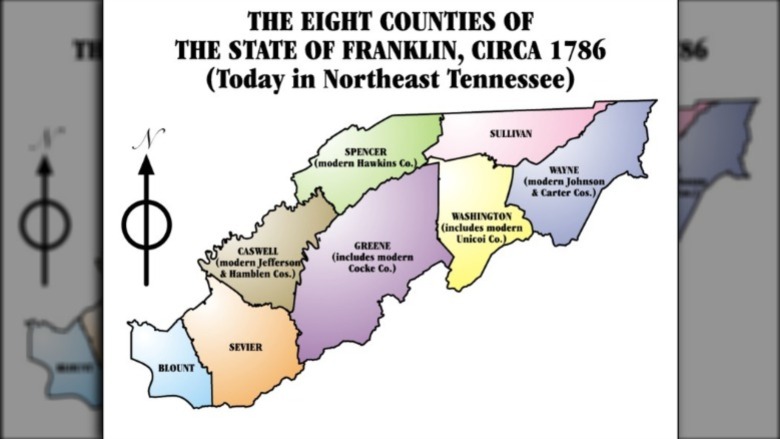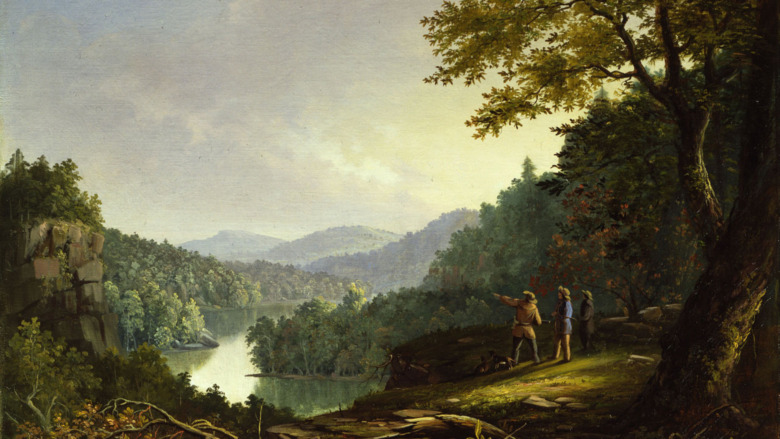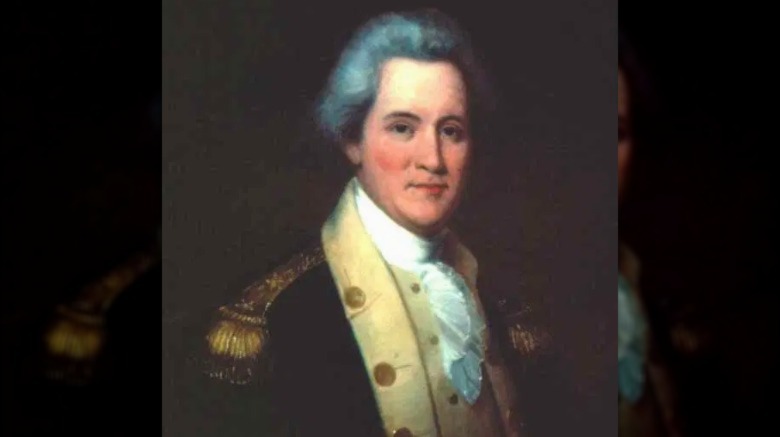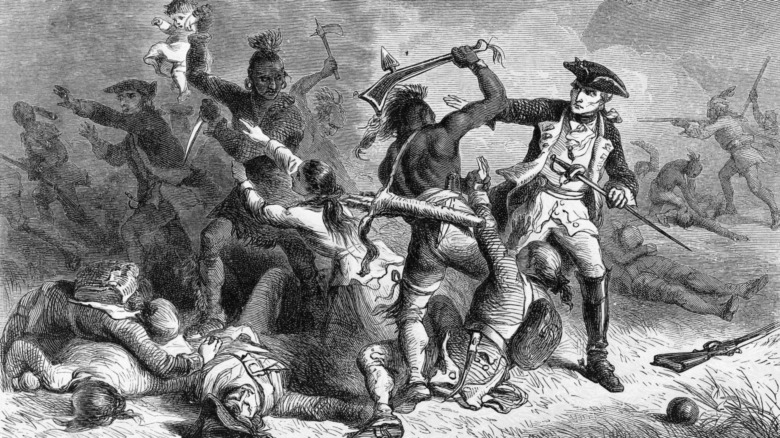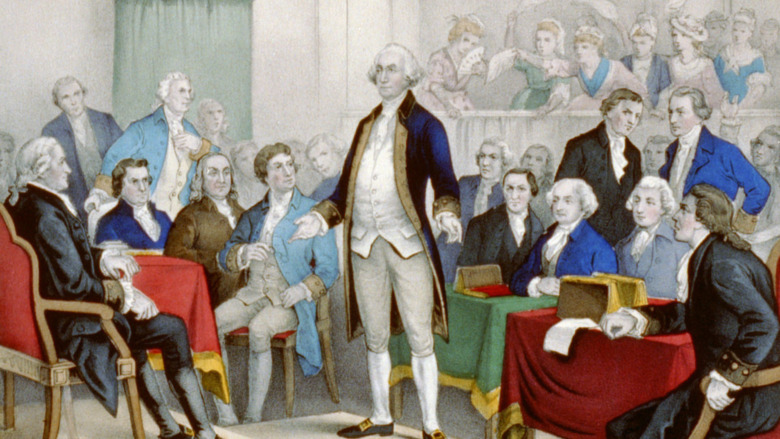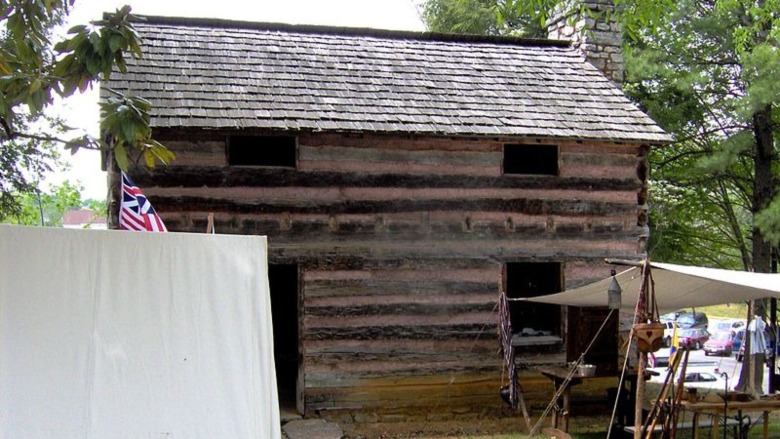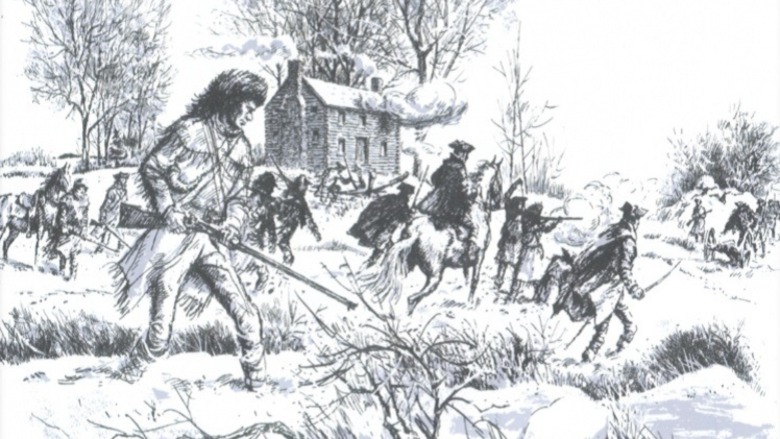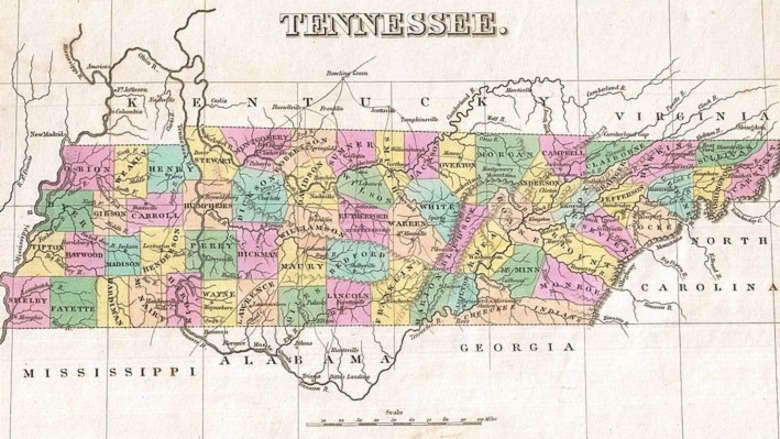The Real Reason There Is No State Of Franklin
If you've read a lick of American history, there's a decent chance you've heard of the 13 colonies. You know, the British colonies that rebelled against the crown and then became the first 13 states of the new United States. And then fast forward a couple centuries, and there are those famous 50 stars on the American flag for the 50 states of the Union. And, sure, it's not like naming all of those states off the top of your head is an easy task, but most people living in America could probably recognize any of the states by name, right? So then, what if the state of Franklin just got tossed out in conversation?
Sounds sort of fake. What, Franklin as in Benjamin Franklin? Is that the reference?
Well, yes. At least, kind of. As it turns out, there were a number of proposed states that could've been added to the US throughout its history. Franklin was one of the earliest of those, being the almost-fourteenth state of the US. Clearly, it didn't make the cut; now, the area is just called northeast Tennessee. What happened, though? What went wrong?
The Revolutionary War created some problems
The entire Revolutionary War narrative is probably pretty familiar to most people. You know, the American Revolutionaries win the Battle of Yorktown and now there's a whole new nation. Freedom, independence, all of that. Sure, there were hiccups along the way, but for the most part, there's a lot of glory tied up in that story.
But things were honestly more complicated than that. Smithsonian Magazine explains that the US Declaration of Independence was really intended for the 13 colonies. They had declared their independence, but there was a lot more land than just the colonies; there was also the entire western frontier. All of a sudden, that raised a new question. Sure, the colonies were free now, but what was the plan for all of that land out to the west?
Basically, there just wasn't a plan. Maybe in the future, those areas could eventually form new states that could enter the Union, or they could be annexed onto an existing state. Maybe they would form their own republic. The future was really hazy, and nothing in the present was helping matters. "The Lost State of Franklin" mentions that the Articles of Confederation really just caused more issues, essentially stifling the US government, stopping it from doing anything when it came to the frontier. It couldn't be developed or even defended.
North Carolina ceded some of their lands
Wars can get expensive, and the Revolutionary War was no exception. Its aftermath left behind a pretty considerable debt, according to ThoughtCo — one which the states had to figure out how to deal with.
When it came to North Carolina, the state government looked to the land west of the Unaka Mountains (via North Carolina History). The area wasn't strongly tied to the government, which didn't want to administer it in the future anyway, so it ended up being the perfect solution to the debt problem. The lands were initially put up for sale, then anything left over was directly ceded to the US government — it paid off what was left of that debt.
But that wasn't taken well by the people who lived in that area, which really isn't surprising. All of a sudden, their land had just been given up, and with the federal government given two years to decide what to do with it, that territory was just in limbo, at least when it came down to all the legal stuff. And with that legal gray area and ambiguity came fears and speculation. What would the federal government do with the land now that they had it? Were they even planning to keep it, or were they going to turn around and sell it to France or Spain as a way to settle debts abroad? As Smithsonian Magazine says, the settlers were concerned over their future.
Franklin's failed bid for statehood
With the future basically up in the air, the people living in the ceded land began looking for their own way to solve the problems they faced. According to Smithsonian Magazine, the settlers living on the frontier had always felt like they were a different people than those living in the colonies, and on top of that, North Carolina History adds that many of those territories had already had a long-standing tradition of self-government, separate from that of North Carolina. Really, these territories were a distinct and unique entity unto themselves.
So the answer seemed almost obvious. The very tentative plan for the future of the United States included the hazy idea that the territories could eventually form their own states and enter the Union. On May 16, 1785, four counties in North Carolina officially put in their bid for statehood as a new entity (via ThoughtCo). That new state was initially planned to be called "Frankland," before later switching to "Franklin," as a way to try and gain the support of Benjamin Franklin (via History). Whether or not Franklin would become a state was put up to a vote, and, fortunately, seven of the 13 states agreed to it — a majority.
Less fortunately, though, that wasn't enough. Under the Articles of Confederation, it just didn't work that way; they needed a two-thirds majority. With that, Franklin's plans to become the fourteenth state of the Union were put to rest.
An independent Franklin
Alright, so the years are sort of weird here, but even though Franklin put in a bid to become a state around mid-1785, it had actually made its first moves about six months earlier. Smithsonian Magazine says that the North Carolina government had actually heard the concerns about ceding the land and took it back from the federal government around November 1784, but the settlers in that land hadn't heard that, declaring their independence about a month later. Then there was that failed bid for statehood, but Franklin still continued operating as its own entity completely outside the US.
To them, it made a lot of sense. Their opinions of the state government were far from good, seeing it as some faraway institution that couldn't and didn't do anything for them. No one could help them when Native Americans attacked their properties, and they suspected that legislators just looked down on western settlers in general (via North Carolina History). Plus, as explained in "The Lost State of Franklin," the people of the frontier had always been different from those in the colonies, unique in their ideology. Unlike the colonies, which had very much been British before the American Revolution, it wasn't like western settlers had ever been flying British flags. They'd only ever listened to themselves anyway.
And so a completely separate entity formed in Franklin, one with its own constitution, and independent legal and economic systems from the rest of the US.
Opinions within Franklin differed
From the start, there were problems with the state of Franklin. For one, the people just couldn't actually agree much on where their new government should be going. Sure, yeah, it's definitely a true thing in history that conflict is really common, especially when it comes to politics, and yes, countries have been able to overcome it. But when it came to Franklin, well, at the very least, it didn't help.
The National Constitution Center tells us that the original, provisional constitution for the state of Franklin was basically just the North Carolina state constitution with a few small changes (like lowering certain requirements for voting). But that wasn't the only constitution in play. The Houston constitution proposed a different system where lawyers, ministers, and doctors were barred from office, along with anyone of "immoral character" or who gambled, drank, or swore.
Ultimately, the original constitution was kept, but the problems didn't end there. Upon declaring their independence, the people of Franklin had chosen John Sevier (pictured above) to act as their new president, but his term didn't go smoothly. According to ThoughtCo, as time passed, the people of Franklin got really tired of persisting problems like war and debt that Sevier just couldn't fix. By 1787, a lot of people were rallying around someone else entirely — John Tipton — and actively calling for them to forgo this entire attempt at independence and just rejoin North Carolina (via North Carolina History).
Franklin's clashes with the Native Americans
One of the problems faced by people living out on the American frontier was the occasional clash with Natives, and while the people of Franklin criticized the North Carolina state government for not doing anything to protect them on that front (via North Carolina History), the act of Franklin becoming independent didn't really fix the problem.
Sure, yes, they did try, pretty quickly going to make deals with some of the Native American tribes like the Cherokee. But even in instances of decent intentions, things still went wrong. The Cherokee had agreed to let white settlers on Cherokee land stay where they were, but the Franklinites saw things differently. They saw it as an opportunity to claim Cherokee lands for themselves, allowing new settlers to move in immediately. Which wasn't great.
But there were also cases where things were a lot less civil. ThoughtCo paints things in a far less sympathetic light to the Franklinites, saying that they were forcibly seizing Native-owned lands, while Kevin T. Barksdale adds that the settlers were even more antagonistic and brutal than that, executing some of the indigenous chiefs or actively engaging the tribes in war. Unsurprisingly, the Native American tribes fought back, raiding settlements and clashing with the settlers in actual wars, like the Chickamauga Cherokee Wars which lasted through to 1788.
Franklin was never really treated like its own nation
This little idea actually can stretch back to Franklin's beginnings, just in terms of the idea that not everyone really believed in its ability to succeed. It'd changed its name to "Franklin" in a desperate bid to win the favor of Benjamin Franklin and other notable figures from the time, but the reality is, it didn't work (via History). It'd gotten a majority in the vote to become a state, but barely, and that had nothing to do with it becoming its own independent nation.
So then, even when it did declare independence and go off on its own, nobody else really recognized it. For one, its borders weren't even well-defined — all the people of Franklin expected was the future opportunity to expand somewhere — but its capital city, Hopewell, was located in Cherokee lands (via North Carolina History). It wasn't even within the bounds of Franklin itself, so no one really recognized it as a capitol at all, much less respected it. It's a bizarre situation.
Then there were the actual legal parts of this. Franklin had made those deals with the Native Americans, but they couldn't really keep up their end of the bargain (via Smithsonian Magazine). In the end, all of their negotiations just got overruled by the deals made between the indigenous tribes and the federal government, and no one really cared all that much.
The government of Franklin was especially weak
When it came to the government, well, the state of Franklin didn't do too well on that front, either, and the problems there really start with problems with the economy. Because Franklin just didn't have any sort of infrastructure. According to ThoughtCo, Franklin never set up its own economic system; instead, it depended mostly on a bartering system and accepted all types of other currency, rather than making their own. And then, to make things even worse, they didn't institute any sort of taxes for their residents for a full two years. What that meant was that the government of Franklin had no money at all, and a lack of funds meant a complete lack of any sort of government services. (A replica of the wannabe state's capitol building is pictured above.) They had basically no power to do anything at all and had to start looking to outside powers for any chance at survival (via History).
So it's really no surprise that the people of Franklin were disappointed. Their new government wasn't accomplishing anything at all, and the stagnating progress meant that, all of a sudden, rejoining North Carolina was looking really nice. That idea was really only made worse when North Carolina started setting up its own government and court system in the area (via North Carolina History), parallel and rivalling those set up by Franklin.
The Battle of Franklin
With tensions on the rise between Sevier's supporters (who wanted to see the continued existence of Franklin) and Tipton's supporters (who wanted to return to North Carolina) things eventually boiled over. It started simply enough. North Carolina History explains that Tipton had managed to persuade a North Carolina sheriff to seize Sevier's properties due to taxes that he still owed to the North Carolina government. With relations already deteriorating, Sevier obviously didn't take it well. In fact, he took it badly enough that he raised a small army of his own and marched on Tipton's house, surrounding it in February 1788.
Tipton-Haynes State Historic Site says that Sevier's force of about a hundred men started to lay siege to the building (they weren't interested in bloodshed), with Sevier sending a few flags of truce to Tipton, demanding their surrender. Tipton just didn't respond the first time, and denied the second. What Sevier might not have known, though, was that a few of Tipton's allies had escaped and were planning to raise a force of their own to fight back; within a couple days, on February 29, an armed force had arrived, undetected, from North Carolina.
Then the shooting started, and the battle was ... relatively uneventful. The actual fighting only lasted about 10 minutes, and with no one really interested in killing, the casualty list only included a small handful of people. Sevier's men retreated, their spirits shattered, and the already-fragile existence of Franklin broken down further.
Accusations of treason
Wobbling on the edge of complete collapse, powerless and at the mercy of internal strife, the government of Franklin sort of needed a miracle to come out of this alive. Unfortunately for them, that savior came in the form of a foreign power.
With all the problems going on, like rising debt and the threat of attacks by Native tribes, Sevier started looking outside for help, and Spain in particular seemed to give him an answer (via ThoughtCo). The Spanish king (pictured) would give Sevier the loan that he would need to be able to raise an army, but it came with a catch: Franklin would have to give itself over to Spain and become a new colony. Honestly, it's actually sort of ironic, considering the settlers in Franklin were initially concerned that the federal government was going to do the exact same thing.
But anyway, sure, annexation by Spain might've saved Franklin's economy, but it really didn't look good to the rest of the US. North Carolina was especially annoyed with this possibility; they didn't want a Spanish colony right on their border (via History), especially when that colony was made up of land that was legally theirs. It all smelled a lot like treason, for good reason. By July 1788, Sevier was arrested for that exact charge (via North Carolina History), and Franklin more or less fell apart after that.
Returned to the Union
By the end of 1788, the entire state of Franklin was pretty much gone, or at the very least, in its last death throes. There was a bit more excitement; Sevier was rescued by a few of his followers, and escaped to the south, establishing a new Lesser Franklin, according to North Carolina History. Not that it really lasted that long, pretty quickly fading away. Smithsonian Magazine adds that after Sevier's term ended with his arrest, and Franklin's legislature didn't even meet again. Things really were over, and by February 1789, Franklin's residents had pledged their allegiance back to North Carolina.
That said, it's not like the state of Franklin didn't have any effects on history. It sort of forced the federal government to start figuring out how to deal with new states, specifically leading to a clause in the Constitution that said a new state couldn't be formed within another state (unless it was approved by a bunch of other people).
And that land didn't just sit there idly. Obviously. There may be no state of Franklin, but as the US began growing, that same area did eventually become part of a state, forming the northeastern part of Tennessee in 1796. So, really, there's no state of Franklin because now, it's the state of Tennessee.
